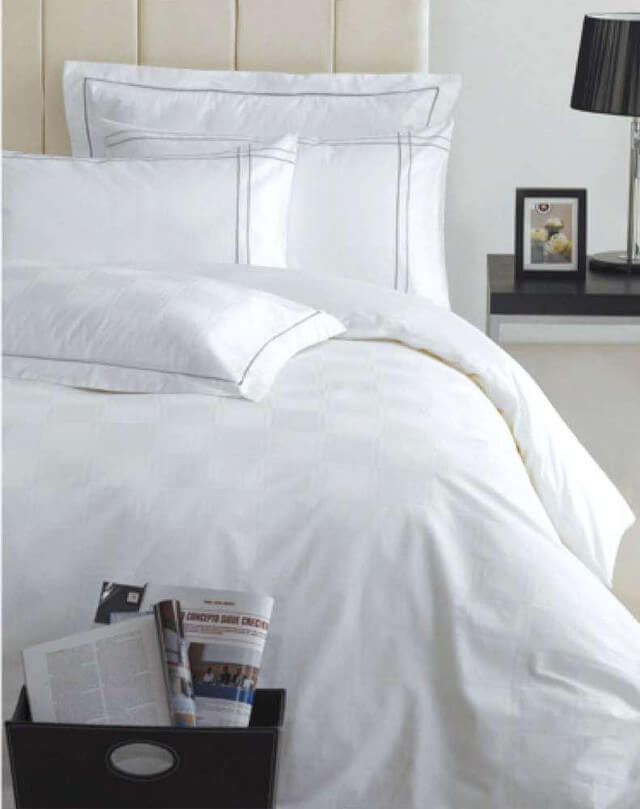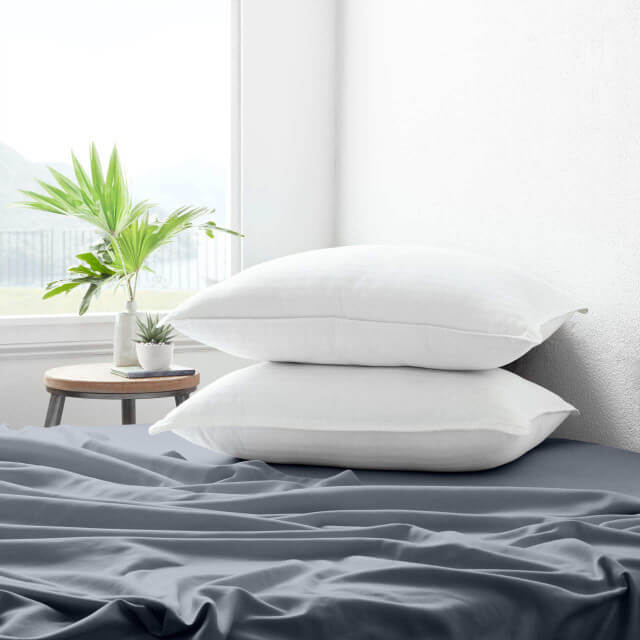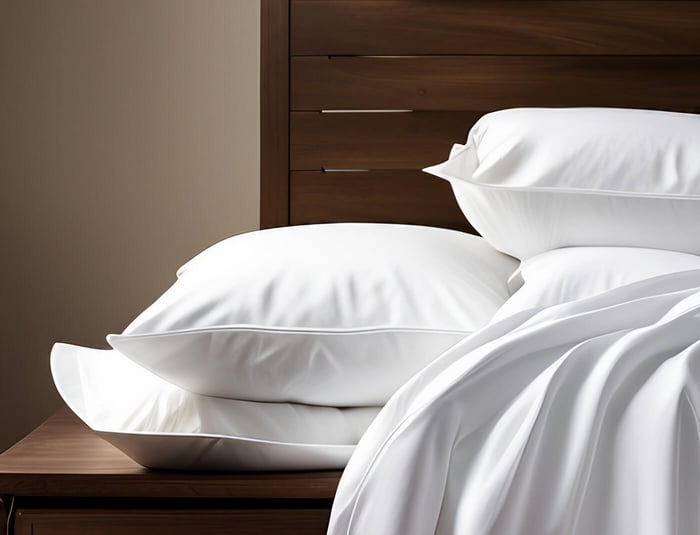What Type of Pillows Are Used in Hospitals? A Guide to Optimal Patient Comfort
In a hospital setting, the type of pillows for patients are made to offer proper comfort and support that are crucial for promoting rest and recovery. Hospitals use specialized pillows designed to address various medical needs and ensure patients have a comfortable and safe sleep experience. Direct Textile Store offers bulk healthcare pillows commonly used in hospitals. Below we will discuss the importance of proper pillow positioning for optimal patient care and the benefits of different types of pillows. Additionally, we'll discuss the benefits of using hospital-grade pillows and the role of reputable suppliers in providing medical pillows.
1. How Should Your Hospital Pillow Be Positioned?
Hospital pillows are specifically engineered to provide essential support to patients during their stay. Proper pillow positioning is vital for patients, especially those recovering from surgeries or dealing with medical conditions. The correct placement of hospital bed pillows can help:
- Elevate Head and Upper Body: To alleviate breathing difficulties or reduce acid reflux, the head and upper body may need elevation. Hospital pillows with different loft levels and wedges can be used for this purpose.
- Support the Back and Spine: Patients who spend extended periods in bed need proper back support. Hospital bed pillows with lumbar rolls or contoured designs can help maintain the natural curve of the spine.
- Prevent Pressure Sores: Patients at risk of developing pressure sores benefit from pillows designed to redistribute pressure and promote circulation, such as donut pillows or pressure relief pillows.
2. How to Position a Knee Pillow
Knee pillows, commonly used in hospitals, are specially shaped to provide support and alignment for patients recovering from lower body surgeries or experiencing leg discomfort. To properly position a knee pillow:
- Lay on Your Back: If you're lying on your back, place the knee pillow beneath your knees to relieve pressure on the lower back and improve circulation.
- Side Sleeping: For side sleepers, position the knee pillow between the knees to keep the spine in proper alignment and reduce strain on the hips and lower back.
3. The Benefits of Hospital-Grade Pillows
Hospital-grade pillows offer several advantages over standard pillows, including:
- Hygiene and Infection Control: Hospital pillows are often designed with antimicrobial or waterproof covers, preventing the growth of bacteria and enhancing infection control.
- Durability and Longevity: These pillows are crafted from high-quality materials, ensuring they can withstand frequent use and washing without losing their shape or support.
- Specialized Design: Hospital-grade pillows are engineered with specific medical purposes in mind, ensuring patients receive the support and comfort they need during recovery.
4. Reputable Hospital Pillows Suppliers and Medical Pillows
For hospitals and medical facilities, it's essential to source medical grade pillows from reputable suppliers. Reliable suppliers offer a wide range of hospital pillows, including specialized options for various medical conditions. They adhere to strict quality standards, ensuring the pillows are safe, durable, and effective in promoting patient well-being.
Different Types of Hospital Pillows

Top-Rate Hospital Pillows
Hospital pillows offer comfort, support, and therapeutic benefits to aid in recovery and overall well-being. Below are some of the most popular pillow types for hospitals or healthcare settings:
- Pressure Relief Pillows: These are designed to distribute weight evenly and reduce pressure points, which is essential for patients who spend extended periods in bed. These pillows help prevent pressure ulcers (bedsores) by minimizing friction and shear forces on the skin. Often made from memory foam or gel-infused foam, these pillows conform to the shape of the body, providing customized support. A great thing about these pillows is they enhance comfort, promote proper blood circulation, and significantly reduce the risk of developing pressure ulcers. Their ability to mold to the patient’s body helps maintain proper alignment of the neck and spine, which is crucial for patients with limited mobility.
- Anti-Microbial Pillows: These are treated with substances that inhibit the growth of bacteria, fungi, and other microorganisms. This feature is particularly important in hospital settings where infection control is a priority. These pillows are typically made from polyester or a polyester-cotton blend and treated with anti-microbial agents. They offer enhanced hygiene, reduce the risk of cross-contamination, and are often hypoallergenic, making them suitable for patients with allergies or compromised immune systems. The ease of cleaning and maintaining these pillows also adds to their practicality in a hospital environment.
- Waterproof Pillows: Waterproof pillows are designed to resist moisture and protect the pillow’s core from fluids, making them ideal for patients with incontinence issues or those who are at risk of spills and leaks. These pillows are usually covered with waterproof materials like vinyl or a waterproof polyester blend. They are easy to clean and disinfect, ensuring a hygienic sleeping environment. The waterproof barrier also extends the pillow's lifespan by preventing the accumulation of moisture, which can lead to mold and bacterial growth.
- Orthopedic Pillows: Orthopedic pillows are ergonomically designed to support specific parts of the body, such as the neck, back, or knees, and are particularly beneficial for patients recovering from surgery or suffering from chronic pain conditions. Commonly made from memory foam or latex, these pillows provide firm support and maintain their shape over time. They help in pain relief, promote proper spinal alignment, and reduce pressure on the body’s joints. Their targeted support can significantly enhance the patient’s comfort and recovery process.
- Disposable Pillows: Disposable pillows are intended for single-use and are often utilized in high-turnover areas such as emergency rooms or during short hospital stays. Made from non-woven materials and filled with polyester fibers, these pillows are designed to be lightweight and cost-effective. They minimize the risk of cross-contamination and are highly practical for situations requiring quick and frequent pillow changes. Since they do not require laundering, they save on cleaning costs and time.
- Maternity Pillows: Maternity pillows are designed to support pregnant women by accommodating their changing bodies and providing relief from common pregnancy discomforts. Typically made from memory foam or high-density polyester, these pillows are often large and contoured to support various parts of the body. They help in alleviating back pain, support the belly, and improve sleeping posture, which is crucial for both the mother and the developing baby’s comfort.
Top-rated hospital pillows at Direct Textile Store cater to various patient needs, from pressure relief and infection control to specific therapeutic uses like orthopedic support and maternity care. Their specialized designs and materials contribute significantly to patient comfort, hygiene, and overall well-being, making them indispensable in healthcare settings. By choosing the right type of pillow, hospitals can enhance patient care and recovery outcomes.
Hospitals use a variety of specialized pillows to enhance patient comfort and support during their stay. Proper positioning of hospital pillows is essential to meet patients' medical needs and prevent complications. Knee pillows play a crucial role in providing support for those recovering from lower body surgeries or dealing with leg discomfort. Opting for hospital-grade pillows ensures infection control, durability, and specialized design for optimal patient care. When sourcing medical pillows, partnering with reputable suppliers is key to ensuring the highest quality products are provided to patients. Prioritizing patient comfort and well-being through the use of appropriate pillows can significantly contribute to their recovery journey.
About the Author
Haley Bridges, Marketing Assistant at Direct Textile Store
Haley Bridges has served as Marketing Assistant at Direct Textile Store, where she specializes in hospitality linens, uniforms, and bulk textile solutions. She works closely with hotels, restaurants, and healthcare facilities to match them with durable, high-quality products that balance both performance and value. Haley's expertise in textile sourcing and merchandising strategy helps businesses make confident purchasing decisions while staying ahead of industry trends.
If you need assistance, contact Direct Textile Store Customer Service at 800-615-5822






